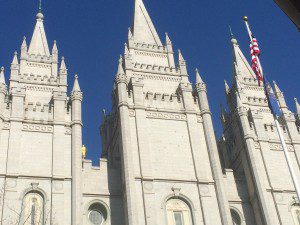 In October 2010, in a fit of pique with our increasingly banal church publications, I wrote the following to The Ensign:
In October 2010, in a fit of pique with our increasingly banal church publications, I wrote the following to The Ensign:
From: Gina Colvin
Sent: Wednesday, October 06, 2010 8:19 PM
To: Ensign
Subject: The Tabloidification of The EnsignPlease accept this feedback with the good grace that is intended.
I have long been a happy recipient of The Ensign. However over the last ten years I have been sadly underwhelmed by both its format and its content. It appears now to be written in sound bites which work to engage its readers with more emotion than information. Is there room in The Ensign to consider more complex, doctrinally engaging copy or will I have to rely on the Bloggernacle for something more robust?
For your information I have received similar unsolicited comments from numerous of my church acquaintances.
Regards
GMC
Today, 18 months later, I got the following, most surprising, reply:
Thank you. You have an excellent point that the Ensign is working to address.
Sincerely,
The Ensign Staff
While I’m thrilled that there is somebody actually out there receiving, thinking about, and responding to emails I can only imagine how many suggestions, letters of complaint, or queries The Ensign must receive to have taken this long to get back to me. I’ve done some rudimentary arithmetic and have figured out that if it took 2 minutes to write this email (and I’m being pretty generous here), based on an average working day of 7.5 hours, and one person alone responding to such feedback, taking an average of 2 minutes to reply to each email, I have calculated that they must get about 54,000 emails per year!!
I can only imagine the pressure The Ensign staff and other ‘Cobbers’ (church office employees) must be under to respond to a membership who, from all accounts seems to be assiduously concerned with petitioning, questioning, second guessing, providing suggestions for, and criticizing the machinations of the ‘Holy SLC’, (an affectionate play on the term the ‘Holy See’ – the Catholic seat of government). A woman I know was a telephonist at the COB for a brief time and can confirm the huge volume of nuisance phone calls they receive from a disgruntled public. I’ve heard that front line staff are issued a book which describes what to say in certain events. Perhaps it looks like this:
Its, Sister … here. I have a question for President Monson.
[Code Monson: page 3, note 1] Thank you for your call, please direct your query to your unit leader.
But I don’t want to talk to him, I want to talk to President Monson.
[Code Monson: page 3, note 2] We encourage all queries to go to your unit leader in the first instance.
But this doesn’t concern my bishop, it concerns President Monson. He’s asked me to do something, I’m supposed to follow him, but I just want a wee chat to figure out some specifics.
[Code Monson: page 3, note 3] Our apologies Sister… President Monson is unable to answer questions of a personal nature. Please seek a response from your unit leader. If you are unsuccessful in this instance then you should pursue the matter with your Stake President.
It’s a slick operation, the Holy SLC, the COB. And it’s very difficult to find anything out about them without leaning on an insider to give you the skinny. The ex-employees are the best people to tackle with questions. If they are mid-career ex-employees chances are they’ll be peeved about something, and from my experience it doesn’t take much to winkle it out of them.
Despite the intriguing investigations of Daymon Smith, the inner machinations of the COB remain somewhat of an enigma. In fact I still remain puzzled about the role, influence, and authority of the COB in ecclesiastical affairs because I have a sneaking suspicion that it isn’t insignificant. Which leads me to ask the question (which I won’t direct at President Monson because he’s clearly to busy for the riff raff ), ‘Who is the church?’
In a previous post I posited that ‘we’ are the ‘Church’. We are the body of Christ. This would be the answer if we were to conduct a thorough scriptural exposition. Through the blood of Christ he claims us through our offering of a broken heart and a contrite spirit. We are his, a community of worshipers who have come together in the faith to work out our salvation and to build a people fit for the Kingdom of God on earth.
That’s all well and good in theory, but I’m puzzled by the Mormon usage of the term ‘The Church’ which has become something of a trope to refer to an entity that exists outside the collective members. ‘The Church’ it would appear is an inscrutable body corporate who exercises a degree of control over us, to whom we have an obligation to align ourselves with, irrespective of our inability to entirely apprehend ‘The Church’. Enough has been said to me about ‘The Church’s’ position on this or that, the way things ought to be done in ‘The Church’, ‘Church Discipline’ etc. to feel reasonably assured that those who talk in this manner are referring to something apart from me, or us. They are referring to an external force with coercive and disciplinary powers and functions whose ‘reality’ I need to be reminded of if I attempt to interrogate and question the ‘authorized’ version of ‘The Church’.
 Take for instance last Sunday. I was asked at the last minute to teach the Relief Society lesson. As this was a text conversation I said ‘yes’ before I found out that the lesson was ‘Sustaining our Leaders’. I have no problem whatsoever with the notion of ‘sustaining’ our leaders – I’m entirely in favour of them doing a good job and will offer any advice they might seek from me to do so (said tongue in cheek). I do however have a problem with the conflation of ideas such as obedience, deference, and conformity with the notion of ‘sustaining’. I study ideological tyrannies for a living and feel very comfortable and at peace with resisting what can end up being deeply problematic social arrangements.
Take for instance last Sunday. I was asked at the last minute to teach the Relief Society lesson. As this was a text conversation I said ‘yes’ before I found out that the lesson was ‘Sustaining our Leaders’. I have no problem whatsoever with the notion of ‘sustaining’ our leaders – I’m entirely in favour of them doing a good job and will offer any advice they might seek from me to do so (said tongue in cheek). I do however have a problem with the conflation of ideas such as obedience, deference, and conformity with the notion of ‘sustaining’. I study ideological tyrannies for a living and feel very comfortable and at peace with resisting what can end up being deeply problematic social arrangements.
However, I agreed to teach this lesson, beginning with an examination of the holy writ in order to identify the desirable attributes of spiritual leaders. We decided in the discussion that these are:
a) an acknowledgement of Christ as our head
b) an absence of spiritual hierarchy
c) humility
d) a service and servant orientation
e) an eschewal of dominion
f) above all demonstrable charity with the primary role of the spiritual leader being that of one who directs us to seek out, know, love and serve Christ.
Having arrived at a consensus, and having used the canon as a basis for our continued discussion I then asked how the class understood ‘sustain’ in this context. It began well as we talked about being yoked to Christ and thereby to each other in the pursuit of a Zion community. Then the predictable Mormon fascists began brandishing their books at me to remind me to look at the manual which states:
Those who oppose and find fault will not find joy in their opposition. Those who criticize and seek to destroy the influence of the leaders of the Church will suffer the result of their wrong-doing.6
How our previously engaging discussion about Christ was thrown into the ditch with some pointed remarks referring not obliquely to my own, errant, and un-cultural Mormon like practices I can’t quite pin point. But I concluded the class with some disappointment that an opportunity for us to be thinking about Christ was displaced over wranglings about our disposition with respect to an expected deference to authority. We could have talked about leadership and sustaining in the context of being first and foremost followers of Jesus Christ. But we didn’t – at least not to my satisfaction.
But, once again, that notion of the ‘Church’ and its concurrent discursive slippage into being popularly constituted as a coercive entity outside of the general membership has caused me to ask a number of questions:
If I would rather talk about and from the scriptures, than The Ensign, the Laurel’s manual, the ‘Teachings of the Prophet’ series, am I undermining Christ, the President of the Church, the Correlation Committee, or the COB paid employees who had the primary responsibility of cobbling the lesson material together in the first place?
If I’m appalled at the hierarchies of power in the church that run through all of its institutional operations and creates boundaries, exclusions, silences and disavowals that protect those in the upper echelons of ecclesiastical authority and corporate power, am I undermining Christ, the President of the Church, or the COB employees who have manufactured these corporate arrangements in the first place.
If I am disgusted by the access to no limit no accountability credit cards to certain church leaders, first class travel, corporate sized ‘stipends’ for ecclesiastical leader’s, the payment of GA children’s tuition fees at BYU, special GA family seating at conference, special dinners, a hierarchized car fleet with Ghia models for those at the top, a building where power relations are reflected in the floor arrangements, am I undermining Christ, the President of the Church, or the COB who sanctions, arranges and physically directs tithe payer money to support these arrangements in the first place?
If I feel uneasy about the role of the PR department in their not insignificant ‘production’ of an ‘image’ of the church which discursively bleeds into how we are supposed to understand ourselves and our doctrine, does that compromise my relationship with Christ, the President of the church, or the COB who have saturated the message of Christ with feel gooders, photo ops with the ‘who’s who?’, emotionally charged sound bites, and woozy tear jerker music?
If I feel utterly saddened by the vilification of good, good people who love the LDS church profoundly but are censured when they seek to bring their ‘unauthorized’ and ‘uncorrelated’ voice to discussions about our faith because nobody at the COB has ‘Code Monson, page 3, note 4: “Patch them through to the President, he loves to talk to the people as much as he is able”’ in their telephonist response manual, does that make me disloyal to Christ, to the President of the church, or the COB?
While I feel reasonably sure that there are those who will argue that Christ is the Prophet is the Church is the COB, I am emphatic about parting company with you here. If you could provide me with a scriptural exposition on how each of the above are indeed each other, then I might reconsider my position. In the meantime I will continue to disaggregate them. –I’ll devote my life to Christ, I’ll listen attentively for the Prophetic messages which leads me to Christ, but I’ll refuse to accept the role of the COB as anything but a spiritual liability who have entangled themselves, their B.Coms, and their grasping corporate, post-Fordist, neo-liberal ways into matters sublime and transformative. Jesus didn’t put them there, tithe payers, and a passable CV did.
PS: I’m off to SLC next week and plan to take tour of the COB. If I can break through some doors I might just ask them myself!!











